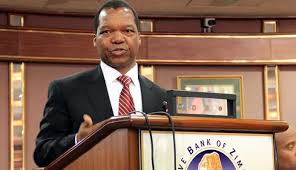RBZ Expected To Review Interest Rates Downwards

CAPTAINS of industry and commerce expect the Reserve Bank of Zimbabwe (RBZ) to review its bank policy interest rates downwards to between 80 and 100 percent in order for businesses to have access to affordable financing.
The RBZ hiked its bank policy rate from 80 to 200 percent last year to discourage speculative borrowing, which was partly blamed for driving exchange rate volatility and inflation resurgence.
Together with other interventions by Treasury, which included the value for money audits, the Zimbabwe dollar exchange rate and inflation stabilised after the volatility experienced during the better part of the first half of 2022. The bank policy rate signifies the level at which the Reserve Bank wants to see bank interest rates and so determines the minimum interest rates charged by commercial banks on loans to borrowers.
With the much-needed macroeconomic stability having been achieved so far on the back of a cocktail of measures implemented by authorities, industry and commerce have been advocating for a downward review of the interest rates.
The RBZ governor Dr John Mangudya is expected to present this year’s monetary policy statement next month. Zimbabwe National Chamber of Commerce (ZNCC) chief executive officer Mr Christopher Mugaga said companies now preferred to borrow in United States dollars due to high-interest rates.
This, he said, was threatening business viability. “In the upcoming monetary policy statement, we expect interest rates to be reviewed downwards to margins between 80 and 100 percent this is because as private sector we understand that the rate of inflation is still a threat to the overall macro-economic stability, but having it come down to those levels will at least give us a breathing space. “Right now, most of the companies are borrowing in US dollars and it’s not sustainable at all,” he said.
Interventions by authorities have seen monthly inflation trending downwards from a high of 30,7 percent in June to 2,4 percent by December 2022 while the annual rate has also come down from 285 percent in August 2022 to 243,8 percent by year-end. Mr Mugaga said it should be taken into account that the global economic outlook remains fragile due to another anticipated deadly Covid-19 variant as well as geo-political issues that threaten the international commodities’ prices.
The global economy has been adversely affected by the Covid-19 pandemic, which forced many countries to embark on national lockdowns and travel restrictions to contain the spread of the viral infection. In this context, the global demand and supply chain system has been disrupted, a development that saw commodity prices for resources such as minerals tumbling down on the international market.
The Russia-Ukraine conflict has also negatively impacted the global supply and demand system as the two countries are the world’s largest suppliers of commodities such as wheat, grain and Liquefied Petroleum Gas. “In relation to the anticipated global shocks, we expect that this year’s monetary policy statement comes up with a buffer that responds to monetary issues that will be threatened by the global shocks.
“For example, though as a country might increase output of our mineral commodities, because of the global shocks prices may go down and this in turn affects us to a certain extent. So, the upcoming monetary policy statement should have measures to tackle such threats,” said Mr Mugaga.
In response to domestic inflation dynamics, as well as the pass-through effects of increases in energy, food prices, and supply chain cost pressures on the economy, the Government tightened fiscal and monetary policies. The measures have contained excessive depreciation of local currency against the US dollar on the parallel market, which was the major driver of domestic inflation.
Mr Mugaga said the private sector expected the Reserve Bank to call for a dialogue with industry and commerce to discuss monetary issues before the presentation of the upcoming policy so that a robust framework is crafted.
He also pointed out that in this year’s monetary policy statement authorities should consider reviewing the minimum banking sector capital threshold from US$30 million to US$25 million to promote the soundness of the financial services industry.
Banks are required to have met the minimum threshold of US$30 million by June this year and the ZNCC chief executive officer, implored the monetary authorities to extend the deadline to June next year to give the financial sector adequate time to meet the required capitalisation levels.
The Confederation of Zimbabwe Industries (CZI) says the increase in interest rates has created a shock in the economy in terms of price adjustments by firms that had borrowed in Zimbabwe dollars, as they needed to pass on the increase to consumers to avoid losses. “Thus, there was an inflationary shock in the initial phase.
However, an interest rate of 200 percent compounded monthly effectively eliminated ZWL$ borrowing, as businesses could not afford such high borrowing costs.
“While speculative borrowing was reduced (which also helped contain the growth of money supply), the policy virtually eliminated borrowing in local currency as a way of finance and reduced industry expansion prospects,” the country’s industrial lobby said in its third quarter of 2022 business and economic intelligence report.
Persistence Gwanyanya, a member of the RBZ Monetary Policy Committee said the date for the upcoming monetary policy presentation had not yet been determined, but was confident the statement would be presented next month. He indicated that the review of the interest rate would be guided by currency and inflation stability.
“Certainly, the forthcoming monetary policy will be presented before the end of next month but a date has not been set as yet. One of the expectations from industry and commerce is the downward review of interest rates from the current levels.
“In December, as the MPC we postponed the review of the interest rates on account that there should be sustained currency and inflation stability, if sustained stability is there by the time the monetary policy statement is presented, the interest rates will be reviewed downwards,” said Mr Gwanyanya.
He said for the greater part of the second half of 2022, there was currency stability before some disturbances were experienced during the festive season. Mr Gwanyanya said RBZ will continue with its tight monetary policy stance aimed at stabilising inflation which is crucial in preserving investor funds and strengthening the Zimbabwe dollar.
Going forward into 2023, he said the Reserve Bank would continue implementing disinflationary measures while further liberalising the foreign exchange market to enhance the operations of the willing buyer-willing seller exchange rate mechanism.








